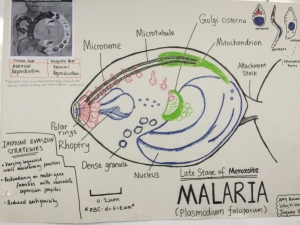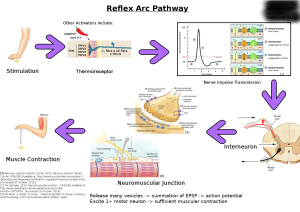Week 1: Organic Chemistry in 48 hours + Cells
I was keen on Biochemistry whilst doing the foundation course before my degree. This portion of the course gave me a refresher of what I had learnt back then, although it would have drowned people without a background in biochemistry-related field in the sea of organic chemistry nomenclature, reactions and quantum.
Cells lectures were on basic cellular structures. However we were asked to present a poster of a cell in the following day as a group. This was the first rather-formally graded assignment. We got allocated Plasmodium falciparum, the deadilest malaria.

Fig. 1. Our glorious poster on Malaria
Fig. 1 is a very condensed version of our group research. Who could have imagined that this very smart and dedicated cell can undergo sexual and asexual reproduction, and transform itself to escape from the host’s immune system?
Then we had a week for signalling pathways. The cascade of signalling molecules, receptors and their actions are extremely complex. It amused me how different members managed to keep the systems going in the right way.

Fig. 2. Neural Reflex demonstration
Fig. 2 is a graphical abstract of what we had been assigned to “perform” or “build a physical model” in order to convey how various events could coordinate.
Finally in week 3, we studied a genetic disease. At the end of the week we individually submitted a short review on the genotype and phenotype correlation in the genetic diseases, and as a group of three we presented the disease concerned to the rest of the class. Systemic lupus erythematosus was the condition that I studied during this time. The catch in this disease is that, since our immune system is multifactorial and can produce limited compensatory power when some components of the system do not function adequately, SLE is only resulted after multiple pathways have gone wrong. The substantial initial research turned into a length description of “what could have gone wrong” in the immune system, which is literally every single component of the immune system.
This was a very intense three-week course that challenged one’s thinking, efficiency of working and ability of working in a team. Next, we move on to programming.